'People call us KeNHA': A story of money and potholes
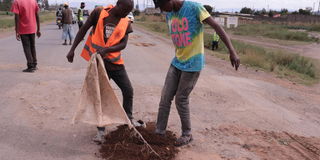
Daniel Njoroge and his friend use their feet to compact soil after filling up a pothole along Pipeline- Mzee Wanyama route on October 3, 2024.
Immediately we turn left into Pipeline towards Mzee wa Nyama headed into Gilgil sub-county, we are off to a rocky start.
We try to dodge the shallow and deep potholes along the route. Other times when we’re faced with oncoming vehicles, we're forced to brace ourselves and drive through the potholes, groaning under the impact, our bodies tense as we're jostled in our seats.
Under the scorching sun, a few meters from a popular oil point along the route, we pass a group of men, some noticeable in reflector vests, only to notice a few minutes later that they are exactly the people we are in search of.
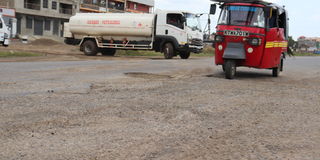
A tuktuk navigates around a pothole along the Pipeline- Mzee Wanyama route on October 3, 2024.
A group dedicated to ‘repairing’ potholes in Mzee Wanyama.
They are on the fence about speaking to us, understandably because they are unaware of our intentions until we explain who we are.
One of the six gentlemen volunteers and starts us off with anticipated remarks about how politicians have been using the road to woo voters and promise jobs.
Jack Njane, a resident of JB along the Pipeline- Mzee wa Nyama route, says he and his comrades have been mending the route since 2021, way before the elections.
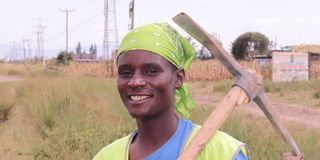
Jack Njane has been filling potholes along the pipeline- Mzee wa Nyama route since 2021.
Even as a certified mechanic, he resolved to this work noting he was unable to raise a Sh. 20,000 down payment for garage space and working as a mason at a construction site could not compensate.
“The pay from working as a mason could not meet my family's needs so I decided to join this group filling potholes. It's not much, but at least it helps put food on the table for my family and I can spare some for rent,” Njane explains.
“Sometimes we get lucky and are called for other jobs including masonry and come and supplement it with this one. We come here almost every day, not just to earn but also to keep ourselves busy. It's better than sitting idle at home.”
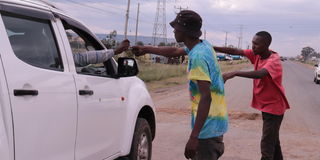
Danie Njoroge receives some money from a motorist after filling up one of the potholes along Pipeline-Mzee wanyama route on October 3, 2024.
Armed with a shovel, jembe, pick axe, and a sack, they show up at work at undesignated times in the morning depending on the work they may have prior, and close at 6 p.m. when cars start turning on their headlights, out of fear of being knocked down.
“On a good day, we can cover about 300 to 400 meters of road and our designated spot is usually between the Catholic area and work our way towards Quare. Previously we covered the route up to Mutaita headed into Jogoo but this proved futile as there is less traffic on that route and the pay is low,” says Njane.
He notes the work is barely easy and the pay is inconsistent with some days earning as much as Sh. 500 while on other days just Sh. 50, enough for rent and food.
The group says they dread the rain because when it pours, overweight trucks carry off the soil filled in the roads making them stay at one point for longer.
While you may want to sit on your high horse and think or remark ‘extortion’ Daniel Njoroge disputes that saying they are paid for work seen.
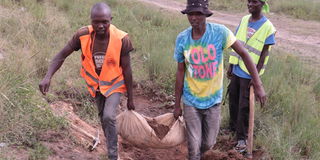
Daniel Njoroge (in black hat) together with his friend carry the already filled gunny with soil used to fill potholes along pipeline- Mzee wa Nyama route on October 3, 2024.
“Road users on this route are not easily gullible. If they do not see the work you’ve done- this means potholes filled- then they will not pay a dime,” he explains. “To woo them, we say ‘niaje anko, dozi ama daddy unanona tunafunika tushimo, kama uneza acha ata ya kachai’. Most times, they are persuaded and give what they have,” says Njoroge.
Like Njane, he has also specialized in gypsum installation, while the rest of the team consists of drivers and a welder.
Njoroge notes that while there may be no official record of their work, they have earned respect in the community because they put in the effort.
“Some months are good and we get called for work that pays well which always goes a long way in helping us progress at home or even pay the accumulating debts. But what irks us are the promises made by our local leaders about helping us get jobs. This despite every other time being told to bring our IDs and certificates of good conduct has always proved fruitless,” he says, now agitated.
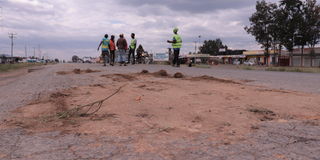
One of the large potholes filled by Njane and his friends along the pipeline- Mzee wa Nyama route on October 3, 2024.
Njoroge says this has been going on for so long that they are no longer hopeful. Instead, they have found a way to look out for each other and call each other when opportunities arise.
To bring them back from the agitation, we ask where they get their tools and this instantly makes him happy.
“Our tools wear out quickly and need frequent replacement as such, we take turns bringing in new tools. There’s no one here that hasn’t brought a tool,” he says laughing, passing a cigarette around. “The rough terrain wears them out quickly, especially the wooden handles, and hence, we keep track of our finances and prioritize purchasing tools for our trade, then pay ourselves later.”
For the pay to happen, they have found themselves a designated accountant (Njane) who collects the money in even or odd divisible numbers depending on their number.
For instance, for every Sh. 300 they collect, it is divided there and then until they collect another Sh. 300. This, Njoroge says, helps them keep tabs on the money they collect and it can all be accounted for.
While at it, we question whether he and the rest have had life-threatening instances and he reveals a long-healed scar on his inner arm.
“Every one of us here has a scar. One time on this road, a tuk-tuk, which I had moved out of its way for, scratched me with its side mirror leaving a deep cut, and fled,” he says pointing to it.
“Usually we get these from drunk and careless road users and there’s nothing we can do to retaliate. We have habitually learnt to weigh in on how much this could smear our reputation and leave everything as is,” Njoroge says pragmatically.
He adds that he has even seen one of his friends flying off the road after being hit by a motorcycle and every so often, motorists flee taking advantage of the fact that they are powerless and have no backup to defend them.
When accidents happen, they have to dig into their pockets to access medical services. When the scenarios get worse they all contribute and take the wounded to hospital.
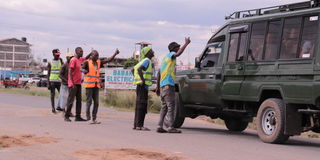
Daniel Njoroge and Jack Njane stop a vehicle asking for some money after filling up potholes along Pipeline-Mzee Wanyama route on October 3, 2024.
Despite the chaos, they remain grounded. They understand that their work is important not just for survival, but in a way for the community which has earned them the name ‘KENHA’.
When tensions rise, they know when to walk away, and if the problem escalates, they have learned to seek help from the authorities instead, whom they have created a rapport with.
For Njoroge, this job helps him support not just himself, but his mother and three siblings.
